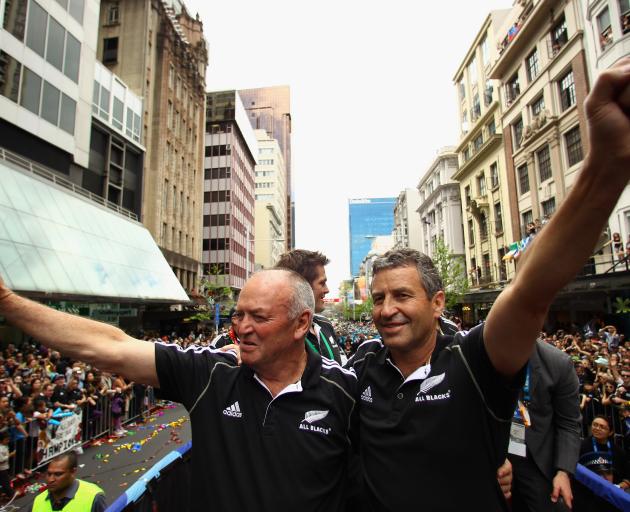
Smith doesn't want this man's influence on all levels of rugby to be forgotten, and so has taken it upon himself to recognise his contribution.
"Graham Henry, along with Steve Hansen, is the greatest rugby coach of our time," Smith says from his Kobe base in Japan. "He has been a winning coach since the 1980s and at 72 retains the skills and sharpness he has been renowned for."
Henry's latest stint as assistant coach with Alama Ieremia's team, following his successful reign from 1992-97 which captured four titles, again demonstrated his love for rugby; his passion for Auckland and his ability to change along with the game and its players.
"That win over Canterbury, in one of the best provincial finals ever, was a lesson in how to turn a team around through humility, respect and personal meaning," Smith added.
"Alama and Filo Tiatia deserve massive kudos for this. They also showed great foresight in getting Graham on board. Not only is Graham a great coach, he is also a wonderful mentor for players and people, from school kids through to the world's best players."
Smith says when spending a weekend with 'Ted' you are just as likely to be roped in to mentoring school leavers as you are involved in coaching somewhere.
He notes Henry has been known to man the barbecue alongside fellow Waiheke Island resident Peter Leitch, aka the Mad Butcher, another of life's givers, to raise money for charity as well as willingly speaking at charitable events.
Offering insight into Henry's influence on his own career, Smith recalled the start of his coaching tenure with the Crusaders in 1997 and, specifically, the New Zealand Rugby Union's Super 12 conference he attended at the beginning of that season.
"The keynote speaker was Graham Henry, who had coached the Blues to the first Super 12 title the year before. He proceeded to give all his secrets away. I couldn't write down the ideas fast enough. He provided a coaching blueprint that a young guy like me could base his programme on.
"It taught me sharing your ideas is a critical part of improving.
"The moment Graham walked out of that lecture theatre he was already planning to change everything he was doing with the Blues. He had forced himself to innovate, to create new ideas.
"He reinvented himself. And, the Blues went on to be even better in 1997. This is a pattern in Graham's life."
Smith says when he, Henry, Hansen and scrum guru Mike Cron began leading the All Blacks together in 2004, they adhered to the traditional coaching model.
"We coached and the players played. Only it wasn't working that well. Along with the guidance of Gilbert Enoka, who incidentally has been as big a catalyst for a winning change in rugby as anyone in history, Ted began to shift the coaching paradigm.
"BJ Lochore was another guiding hand and influential thinker, and together we changed the environment from one of authoritarian leadership and instruction to a model of dual ownership."
This shared responsibility model is one Auckland adopted this season to evoke the best from their leadership group; one the All Blacks continue to use with great success, and one countless professional teams around the world now attempt to replicate.
"Great leaders emerged, the decisions were no longer made unilaterally by the coaches, and players became more accountable for their own preparation and performance.
"The genius of Graham was to understand the need for change, to lead it and trust the people around him to help guide it.
"The genius of Steve Hansen has been to continue that growth and, in his own way, drive forward a paradigm that is changing the rugby world. Graham is part of this legacy."
